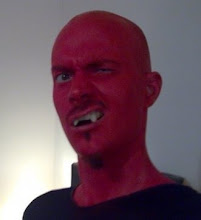The Brothers Bloom
From the opening scenes the Brothers Bloom cultivates an air of the quirky American indie, shades of Wes Anderson et al in the voice overs and present day characters often wearing period suits.
The film is good though, breezily enjoyable rather than slavishly trying to fit within a particular sub-classification of American cinema. Mark Ruffalo is excellent as always, here as a slightly shadier character than usual but reveling as the brash showman Stephen to Adrian Brody’s more introspective, melancholic and rumpled Bloom. The prologue sees the brothers in and out of foster homes until Stephen finds a talent in constructing elaborate long cons, complete with character development and narrative arcs. Jumping to the present day we find Bloom miserable at having to live out his life as his brother’s characters. He runs away only to be tracked down by their mysterious Japanese pyrotechnic expert Bang Bang, when Stephen persuades him into one last con with the added advantage of Rachel Weisz as bait. She has inherited vast sums and spends her days shut up in a mansion learning various random skills. Weisz plays the archetypal quirky girl, but although her circumstances are less than credible she manages to create a believable character from it. Stephen embroils her in a convoluted, international quest involving cat burglary, train journeys, explosives and Robbie Coltrane. Bloom is ethically confused as they deceive the girl, although she simultaneously seems to know that it’s all staged and decides to get caught up in the adventure regardless.
As a movie openly about cons, stories and twists you find yourself constantly second-guessing the reality of any scenes, the depths of Stephen’s set-up and everyone’s motivations, but this guessing removes the audience a step back from the fiction and pulls you away from the characters.
Despite this the whole production is likeable, with Bloom’s melancholy an enriching counterpoint to the jovial, quirky tone that the film mostly holds, closely resembling an Anderson feature with the location trotting and that general feel that isn’t exactly timeless but that could take place in a number of periods whilst set firmly in none. It may not be entirely successful but it’s certainly good enough.
The Killer Inside Me
It would seem willfully contrary to talk about Michael Winterbottom’s The Killer Inside Me without touching on the controversy surrounding the violence found in the movie.
Men have killed women on film for decades, but the visceral impact of Casey Affleck’s Sheriff Lou Ford punching Jessica Alba’s prostitute Joyce into a pulp is heightened by her “I love you”, delivered before losing consciousness. This unpalatable reaction is a repeat of an earlier scene; after attacking him for threatening to run her out of town, Ford’s retaliation is over the top, taking his belt to her backside. When he catches himself and apologises she asks him not to be sorry, they then embrace and thus begins a torrid affair.
The violence itself, whilst undeniably shocking and horrible, to me doesn’t seem worse than examples elsewhere. Fight Club may seem a farcical comparison as the violence is between males and in a context where it is consensual, but when Jared Leto’s Angel Face is overpowered by Edward Norton’s narrator, only to have his face caved in as Tyler Durden’s voiceover explains that he wanted to ‘destroy something beautiful’ to the shocked faces of other club members, it seems just as visceral. The difference with The Killer Inside Me is down to the context, the idea that Ford’s violence could inspire love, or that he could genuinely love someone who he then proceeds to physically destroy.
Aside from the controversy over two specific scenes there is something ultimately unsatisfactory with the film although it’s hard to put a finger on. The calm manner in which Ford deals with every situation (his killings, while brutal, seem to be a necessary chore) lends the film a dream like quality in keeping with the almost mythical 50s small town Americana setting, but this extends to the plot in terms of a loose structure which isn’t concerned with motivation.
The flashback snippets picking out details from Ford’s childhood are obviously intended to explain how he has turned out but they only hazily sketch out some beginnings of a pathology, most of his murderous inclinations seem to spring from nowhere. In American Psycho Patrick Bateman has no remorse for his victims but he is anxious about his self-preservation and social standing; here Ford barely expresses any interest in his own life, due to his actions it’s hard to believe in his love and there seems to be little motivation in anything else - he’s not driven to kill outside his intricate planning, he doesn’t seem genuinely interested in either the revenge or money gained from his initial plan and he doesn’t seem particularly dedicated to either saving his own skin or destroying himself (in the end he is more resigned to fate).
The controversy over the film’s violence has created a lot of interest in a film which perhaps couldn’t sustain it otherwise.


0 comments:
Post a Comment